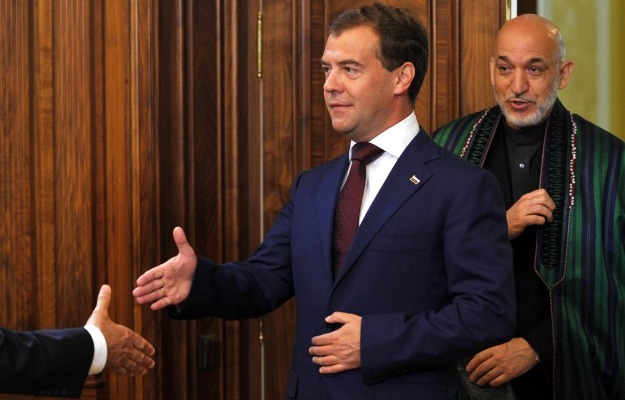
From Jakub Kulhanek, the New Atlanticist: The looming withdrawal of US and NATO troops from Afghanistan slated for 2014 poses for Moscow a serious geopolitical predicament. In spite of their conspicuous silence on the matter, Russian officials have been growing increasingly uneasy about the potential vacuum. Yet still some in the Russian leadership see this as a welcome opportunity to expand influence in Central Asia at the expanse of the West. Moreover, Moscow’s quest for a greater role in Afghanistan is intrinsically connected with its wider ambitions in the post-Soviet space.
Recent events have shed light on Russia’s aspirations in Central Asia in general and Afghanistan in particular. First, Moscow convened a regional summit in the Tajik capital Dushanbe attended by presidents of Afghanistan, Russia, Tajikistan and Pakistan. Although the agenda was mainly dominated by economic and trade issues, the four presidents did not stop short of expressing their concerns over the deteriorating security situation in Afghanistan and the impeding withdrawal of NATO forces from the country. From Russia’s point of view, it hopes that this and similar regional gatherings will help it buttress regional security and by extension also increase its influence in the region. Despite vague proclamations, however, the meeting produced few tangible results and Moscow walked out empty handed. Second, Igor Yurgens, a close confidante of Russian President Dmitry Medvedev and the head of the Institute of Contemporary Development, unveiled a report on how to boost Russia’s role in Central Asia. Speaking at the Yaroslavl Global Policy Forum, Yurgens called for transforming the Collective Security Treaty Organization (CSTO), a Russia-backed security organization, into an effective instrument of projecting Russia’s influence in the post-Soviet space, namely Central Asia. Nevertheless, since its foundation the CSTO has been severely hindered by petty conflicts and general lack of commitment among its members to much chagrin of Moscow. These two events have something in common as they both point out to Russia’s sense of entitlement to play a more prominent role in the region but at the same time one can hardly escape the reality of Moscow’s shrinking foreign policy resources to pursue such an ambitious policy.
Since the demise of the Soviet Union, Russia has struggled to define its place in its neighborhood and come to terms with the loss of former subjects. This has taken on different forms in Moscow pushing, to a varying degree of success, for political, security and economic integration. A good case in point has been Central Asia, where Russia has been particularly active with the aim of retaining its grip on the post-Soviet republics. Vast natural resources, feeble autocratic governments, and threat of religious extremism have acted as a powerful magnet for the Russian political and military establishment. But Russia has also been drawn to the region fearing the spread of militant extremism from Afghanistan into Central Asia and Russia’s own soft underbelly. . . .
Jakub Kulhanek is the head of the East European Center at the Association for International Relations in Prague. He is currently with the School of Politics and International Relations at the University of Nottingham.
Image: afp%2011%2011%2010%20Russia%20Afghanistan.jpg
